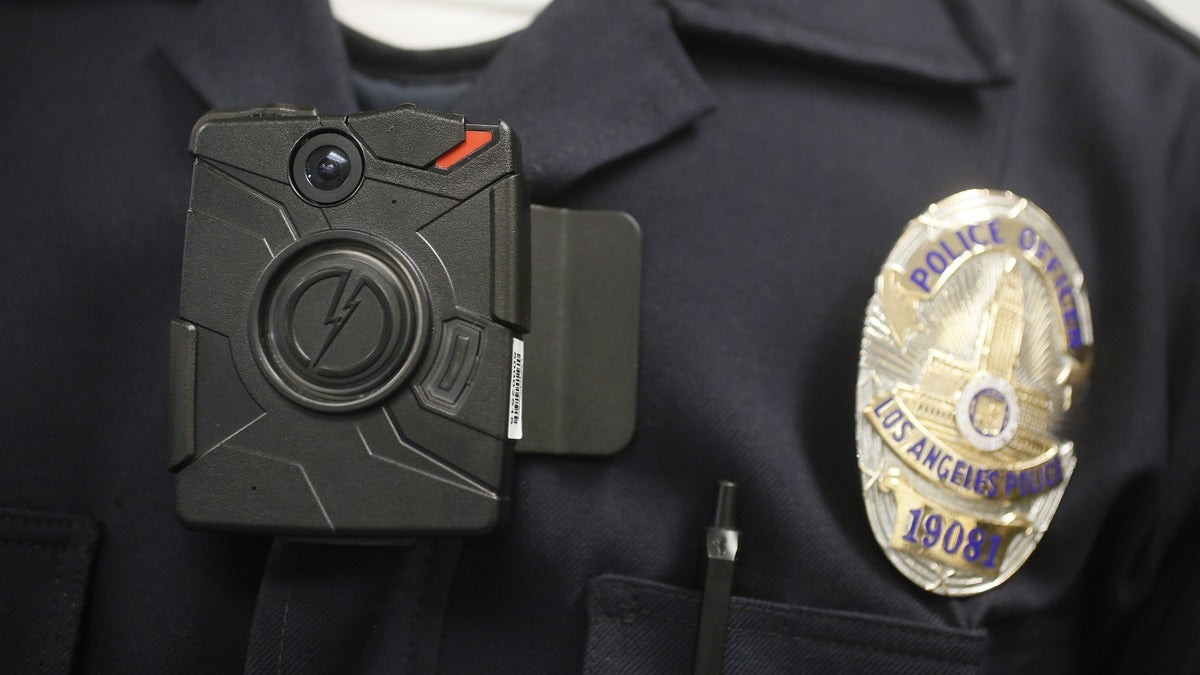Debate over police body cameras continues in Delaware

In this file photo, a Los Angeles Police officer wears an on-body camera during a demonstration for media. The fatal police shooting of the unarmed black teenager in Ferguson, Mo. has prompted calls for more officers to wear so-called "body cameras," simple, lapel-mounted gadgets that record the interactions between the public and law enforcement. (AP Photo/Damian Dovarganes, File)
Where are Wilmington police officer cameras? Are they necessary?
Here is John Watson’s commentary:
Let’s consider all that has been happening with the Wilmington Police Department. The department divided the city into three separate police sectors. There is a new homicide unit, created after months of pressure from city residents. The Williams administration has a new police chief, Bobby Cummings, after the city’s first female chief resigned.
All those factors come into play as Wilmington Mayor Dennis Williams tries to live up to his promise of a major reduction in the violent crime rate. Violent crime reduction did occur during the his first year, but Wilmington is still rated as the third worst in violent crime among 450 cities of comparable size, according to FBI statistics.
But what about those complaints we still hear regarding to need changes in how some officers go about their jobs? The News Journal reports Wilmington already has police body cameras in storage. But no one says how many there are, when they will be used, or how much they cost.
What’s up Mayor Williams? We don’t need a Ferguson incident here. The use of such cameras could have helped the grand jury come up with more to think about in the Michael Brown case.
It’s reported that Governor Jack Markell is agreeable to the use of body cameras on police and it is now being considered by Delaware State Police officials. That is an important step as civil rights groups calls for this new technology after Michael Brown was killed.
Markell has a meeting planned with Delaware State Police Colonel Nathaniel McQueen, Jr. and Richard Smith, President of the Delaware NAACP. That group has called for Delaware law enforcers to be equipped with body cameras.
Smith says body cameras worn on an officer’s chest or shoulder would provide the true account of what really happened when the officer deals with the public and protecting police from lawsuits.
“It protects both parties, police and the citizens,” he said. “The community really wants cameras on police. If the officer in Ferguson had a camera on him, even when he went after Mr. Brown, it would have been a different outcome.”
The News Journal reports the police department in Dover has each police vehicle equipped with a camera and the officer wears a microphone. There are no body cameras for its 93 officers, but a spokesman said they are always open to improve services and protect their officers and the public, and that includes the use of body cameras and other new technology.
Fred Calhoun, President of the Delaware Fraternal Order of Police, a group that represents 2,500 law enforcement Officers in Delaware, agrees with civil rights advocates that there is some merit in body cameras. But he said there are some outstanding questions about privacy for officers who should not be subject to surveillance seated in their car or getting lunch, or during a time they are not responding to an incident.
Jay Stanley, an American Civil Liberties Union senior policy analyst, said that police with body cameras are different because of their potential to serve as a check against the abuse of power by public officials.
As for Smith, the Delaware NAACP president said the distrust among members of the black community and the police the basis of the call for cameras on police. “I want to make sure we get to the root of the problem we have in the United States and a police vs. the black community [attitude],” he said.
Here’s my final thought and it is something I have thought about for a long time. It occurs to me that there should be more respect from both sides. Respect for police and respect for African-Americans. It would solve many of our racial problems.
———–
John Watson is a long time observer of Delaware from his perch as a radio talk show host. You can comment to John via email: JohnWatson1506@comcast.net
WHYY is your source for fact-based, in-depth journalism and information. As a nonprofit organization, we rely on financial support from readers like you. Please give today.




